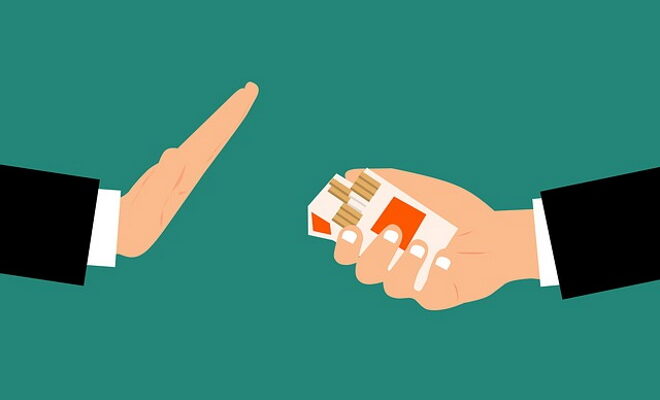
The Gen XY Lifestyle
What happens when you consult a doctor to help you quit smoking?
We know that to quit smoking can be challenge. If you need extra support, consult a pharmacist or doctor to see what the options and recommendations. We share what happens at that consultation so you have the information needed to make decisions.
The benefits of quitting smoking go beyond just physical health. Did you know that smoking can also impact your mental health? Smokers tend to experience more anxiety and tension as smoking can elevate your heart rate. Many smokers also report feeling tense before their next cigarette. By quitting, you can remove another factor contributing to mental stress.
During the quitting process, you might experience cravings and discomfort. Dr Alvin Ng Choon Yong, a consultant Respiratory Physician and Intensivist with The Respiratory Practice shares the following tips to cope:
- Keep healthy snacks like nuts, fruits and vegetables handy and take them when tempted to eat, as a replacement of the hand-to-mouth action of smoking
- Keep reminding yourself of the benefits to your health when you stop smoking. For example, within 20 minutes, your blood pressure and pulse rate returns to normal. After 48 hours, there will be no nicotine left in your body, and your ability to taste and smell will be greatly improved.
- Physical activity is also an excellent way of dealing with the stress of quitting and cigarette cravings. Walk, run, swim, or take up a new activity.

If you find that you need more support to quit, consult a pharmacist or doctor to see what the options and recommendations are. They can recommend tools such as Nicotine Replacement Therapy (NRT) that can help you curb nicotine cravings and manage your withdrawal symptoms effectively.
The Active Age had a discussion with Rachael Lee, a Pharmacist and Certified Quit Consultant about what happens during the consultation and how they help smokers quit smoking, and how to maintain a ‘quitter’ mindset.
the Active Age (AA): What happens at the first consultation?
Rachael Lee (RL): During the first consultation, we are introduced as a source of medical advice as well as encouragement and support for smokers who are keen to quit.
At the first stage, we sit down to understand their intentions including understanding their smoker personality and habits as well as addressing their fears and concerns. This will help us to better understand the challenges they are facing and why they are making the decision.
Additionally, we would want to understand and assess their level of addiction and analyse if any quit attempts were made previously.
Thereafter, we will map out a quit plan that works for them and aid in the process of helping them find their personal motivation.
Generally, while the process differs for each person, the goal is the same – to help and support them in their journey to quit.
AA: What are the typical questions they ask the physician about smoking, its impact on health and how to quit
RL: Patients typically try to understand the duration and process of the quit journey. Research has found that there is a reduced risk of relapsing after staying smoke-free for 28 days. At the same time, it is also helpful to note that everyone’s journey can differ from person to person. Some treatments may work for others but not necessarily for the patient.
However, making the decision to quit is the first step to achieving long-term success so the important thing is to take that first step and we can work together with the patient to achieve their goal.
We also receive questions on the type of quit methods and medications available, what to avoid and what to do instead of smoking.
AA: How does a physician know whether the smoker is ready to quit, or can be influenced to do so?
RL: When he/she makes the first step to speak with someone and commit to the journey with a medical professional, this means that they are probably at the stage of contemplation or preparation to quit.
This is where we will provide support with the right resources, treatment options and counselling. We will try to understand why they started smoking and what are their triggers so that we can recommend the right methods and quit aids to help curb withdrawal symptoms or cravings. On the other hand, for those who are not ready, we do not want to force them into quitting either.
The motivation and decision to quit must come from within.
As a pharmacist and Quit Consultant, we render support by encouraging them to verbalise their feelings, identify what needs to happen before they can move forward, address their personal barriers if there are any and most importantly, to offer support by letting them know we are here whenever they are ready for this journey.
At the end of the day, each journey is different, but we are here to identify the right methods that works for each individual to help them quit successfully.
AA: What are the primary and alternative options and/or recommendations that the physician normally makes?
RL: We have many patients who want to quit smoking and we are experienced in counselling and providing the correct medical treatment options. We want to ensure that we are supporting quitters to quit successfully.
The more dependent a smoker is on nicotine, the more essential it is to have some form of quit aid to counter the physiological dependence on nicotine. Many try to quit with traditional methods like tapering or going cold turkey. However, there are also tools available that can help get them through the quitting journey.
Depending on their level of nicotine dependence, doctors or pharmacists may prescribe quit-smoking aids such as Nicotine Replacement Therapy (NRT), which can help to mitigate the effects of nicotine cravings and can double the chances of quitting. It works by releasing therapeutic nicotine into the bloodstream in the form of gum, patches, sprays, or lozenges, at much lower levels than a cigarette, without the tar, carbon monoxide, and other harmful tobacco smoke chemicals.
Based on the smoker’s medical and smoker profile, pharmacists will also be able to identify the appropriate NRT product for the smoker. Smokers can speak to a pharmacist or consult a doctor to learn more about Nicotine Replacement Therapy.
Additionally, we will also recommend motivational activities like writing down a list of reasons or motivations for quitting and getting into an exercise regime to boost the chances of success at quitting smoking. These further recommendations will also vary according to the smoker profile and the triggers they face. For example, for habitual smokers who associate smoking with their routine or location, we can guide them on how to change the routine in order to break that association. For stress smokers, on the other hand, we can help to find an alternative way to manage the stress or negative emotions they are facing.
There is professional help available, where smokers can call QuitLine and sign up with Health Promotion Board’s iQuit programme.
In particular, smokers looking to quit can also consider the Start To S.T.O.P (Speak TO your Pharmacist) Programme. It is a smoking cessation programme available in the community pharmacies designed to help smokers quit smoking more effectively with close follow-ups. The programme is 6 weeks long and comprises face-to-face and over-the-phone call counselling. Each session is completely tailored accordingly to the smoker’s needs, habits as well as progress. Benefits from the programme include:
- Helping smokers identify their smoking personality and habits
- Providing coping mechanisms to help them manage triggers effectively
- Analyzing past attempts and how they could be improved this time round
- Offering advice on smoking cessation medications
- Providing a listening ear and offering support throughout journey
To take part in the Start to S.T.O.P. Programme, participants can sign up directly on Guardian webpage, through IQUIT campaign (via HealthHub webpage) or walk in to any of the Guardian pharmacies.
AA: How can smokers look to quit, instil or maintain the quitter mindset?
Always remember that it is never too late to quit smoking. Understand that there are immense health benefits when choosing to quit smoking and go smoke-free. In fact, the health benefits from quitting begin as soon as the first hour of quitting. In the long run, quitters can also reduce the risk of various critical conditions such as lung cancer, heart attack or stroke.
Do not be discouraged if you experience a slip or a relapse during your journey, because relapse is not a mark of failure and each attempt is a learning opportunity to get better as you go along.

A successful quit journey comprises being motivated, having sufficient knowledge and preparation, good support system and several quit attempts.
Image by mohamed Hassan from Pixabay









